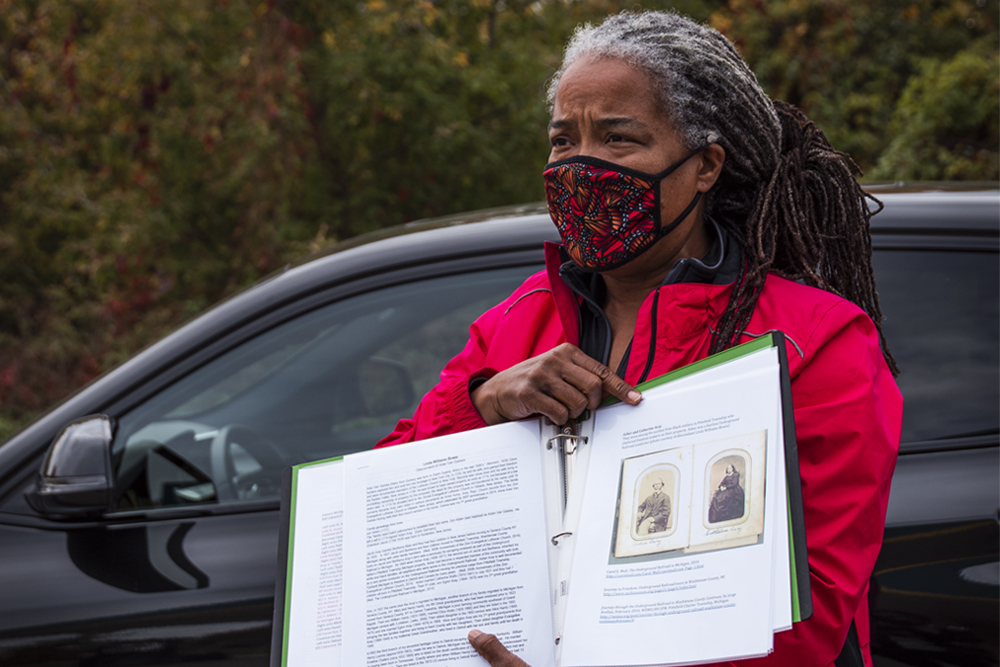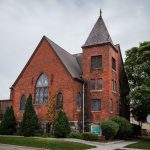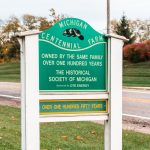
“This info isn’t in the books. The kids don’t get it, so we try to pass it along,” said Meadows, who was born and raised in Ypsilanti. Torrence Williams | Washtenaw Voice
By Debra Destefani
Deputy Editor
On the way home from work, while heading to school or grocery shopping, do you ever wonder about the history of the places you’re driving past?
Often overlooked, there is rich local history in the most unexpected of places, and the town of Ypsilanti, Michigan is just one of those special places.
Ypsilanti has an abundance of historical significance, and from its founding, its residents stood up for social justice during the era of slavery by contributing to the Underground Railroad network.
The African American Cultural and Historical Museum of Washtenaw County aims to spread this knowledge with their “Journey to Freedom Underground Railroad Bus Tour,” which takes local history seekers on a tour of several sites that hold significance to the history of Ypsilanti’s Black community.
In typical years, AACHM hosts about a dozen of these tours a year and is accredited by the Department of Interior National Network to Freedom. Now, Deborah Meadows, a nurse at St. Joseph Mercy Hospital and native of the area, guides one-on-one tours by request to teach the big history this small city holds.
According to Meadows, many African Americans in Ypsilanti and neighboring city Ann Arbor are descendants of slaves. When searching to understand the history of the origins of the Black community in an area, “you look for churches, you look for schools”, Meadows said.
“It was a grassroots movement. Churches and neighbors were involved. Neighbors would provide houses and people in the vicinity would help,” said Meadows.
In Ypsilanti’s case, this history has roots in the community surrounding the African Methodist Episcopal church on Buffalo Street, a stop on the tour which is located between the Heritage Park and Midtown neighborhoods.
- The AME church is directly next to the old schoolhouse (now the New Jerusalem Baptist church) located at 407 S. Adams. Torrence Williams | Washtenaw Voice
- The AME church is directly next to the old schoolhouse (now the New Jerusalem Baptist church) located at 407 S. Adams. Torrence Williams | Washtenaw Voice
- The AME church is directly next to the old schoolhouse (now the New Jerusalem Baptist church) located at 407 S. Adams. Torrence Williams | Washtenaw Voice
Recognized in 1848, the AME church was one of the first Black congregations in Ypsilanti. The church is a large, beautiful brick building with original stained glass windows. Services are still held there. The tall building is a neighborhood landmark and directly next door is the quaint, white schoolhouse.
Another stop on the tour is the William Harwood family farm, a big, white farmhouse with a large cornfield behind it, located off Michigan Avenue (which was once known as the old Sauk Trail, and then later as the Detroit-Chicago turnpike). As one of the co-founders of Ypsilanti, Harwood’s involvement in the Underground Railroad and his reputation for being an abolitionist drives home the fact that Ypsilanti was always rooted in the belief of social justice for people of color.
- The Harwood family home, located at 6356 E. Michigan Avenue, was included in the National Underground Railroad Network to Freedom by the National Park Service in 2005. Torrence Williams | Washtenaw Voice
- The Harwood family home, located at 6356 E. Michigan Avenue, was included in the National Underground Railroad Network to Freedom by the National Park Service in 2005. Torrence Williams | Washtenaw Voice
According to Meadows, ledgers showed that Harwood was part of a network of abolitionists, and that some family members claim there may have been a shallow compartment at some point in the basement.
But Meadows reiterated that “it’s not about the hiding places, it’s about the people.”
“The reason for coming all this way was to be free. Slaves left because they or somebody they knew was going to be sold,” she said.
Behind the farm is the Harwood family cemetery, where William and his wife are buried, as well as several other family members and significant residents of the area. What makes this stop special is that both white and Black people were buried here, which was uncommon at that time.
- A historical marker sits at the entrance of the family cemetery, which is located at 2300 E Textile Rd. Torrence Williams | Washtenaw Voice
- A historical marker sits at the entrance of the family cemetery, which is located at 2300 E Textile Rd. Torrence Williams | Washtenaw Voice
Harwood’s grave is within eyesight of another abolitionist named Asher Aray, who owned property near the Harwood farm.
Aray and his family helped shelter slaves during their journey to freedom. Notably, they assisted “The 28,” a group of 28 courageous men, women and children who escaped slavery in Kentucky. Their story is now one of the most well-known in Underground Railroad history.
The bravery and boldness of Ypsilanti’s original residents and of the freedom seekers they helped is a part of history that deserves to be remembered and that residents can be proud of. Learning about local history breathes new life into our past, and allows for a change in perspective.
More information about Ypsilanti’s history and contribution to the Underground Railroad network can be found on the African American Cultural and Historical Museum website.
To request a spot on The Journey to Freedom Underground Railroad tour, contact Deborah Meadows at dmeadows02@comcast.net or (734) 819-8182.
Get stories like this delivered to your inbox by signing up for our newsletter, The Loop.









